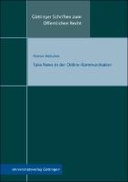Explore

Fake News in der Online-Kommunikation
Patrick Nölscher
2023
0 Ungluers have
Faved this Work
Login to Fave
For as long as anyone can remember, fake news has been a central problem for the formation of individual and public opinion. Today, the effect of widespread disinformation is amplified by the technical possibilities of online communication, such as echo chambers in social networks or the use of artificial opinion amplifiers. From a cognitive science perspective, it is very difficult to correct the effects of disinformation once it has been expressed. The paper therefore deals with the protection of fake news in online communication under fundamental law on the basis of the case law of the German Federal Constitutional Court, the European Court of Human Rights and an epistemological view, taking into account newer communication modalities such as content dissemination in social networks and video sharing services as well as the dissemination of statements with the help of social bots. After describing the constitutional regulatory framework of the dissemination of fake news, the work is devoted to their regulation in Germany de lege lata. On the one hand, the paper focuses on explaining and evaluating the existing regulation of social bots under the Interstate Treaty on the Media (MStV), taking into account higher-ranking law. On the other hand, the thesis discusses and evaluates the regulation of social networks and video sharing services on the basis of the more recent Digital Services Act (DSA) in comparison to the Network Enforcement Act (NetzDG) and points out areas of tension under basic communications law. Based on the insights gained from the evaluations of existing regulation and the constitutional standards described in relation to the dissemination of disinformation, it is possible to formulate options for action for the (German) legislator that could increase protection against the influence of disinformation on individual and public opinion formation in the context of social bot communication and communication in social networks as well as video sharing services.
This book is included in DOAB.
Why read this book? Have your say.
You must be logged in to comment.
Rights Information
Are you the author or publisher of this work? If so, you can claim it as yours by registering as an Unglue.it rights holder.Downloads
This work has been downloaded 22 times via unglue.it ebook links.
- 22 - pdf (CC BY-SA) at Unglue.it.
Keywords
- constitutional regulatory framework
- Digital Services Act (DSA)
- Interstate Treaty on the Media (MStV)
- Law
- Network Enforcement Act (NetzDG)
Links
DOI: 10.17875/gup2023-2438Editions

